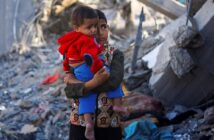South Korea reported a jump in new coronavirus cases on Wednesday as authorities tested hundreds of staff at a call centre where the disease appeared this week, reversing 11 days of slowing infections, health officials said.
Another 242 new cases were reported compared with only 35 a day earlier, bringing the total in Asia’s worst outbreak outside mainland China to 7,755, the Korea Centers for Disease Control and Prevention (KCDC) said. The death toll rose by one to 60.
The daily tally of new cases in South Korea peaked at 909 on Feb. 29, as authorities tested about 200,000 followers of a fringe Christian church at the centre of the nation’s epidemic.
With that task almost done, the infection rate had slowed in recent days, raising hopes that South Korea might be bringing the virus under control.
But new clusters at the call centre in Seoul, and among teachers and students of a dance school with classes around the country, have kept authorities on high alert for a fresh spike in infections.
“The mass infections at the call centre could be the beginning of a fresh tide that leads to a widespread regional outbreak,” Seoul Mayor Park Won-soon told a briefing.
At least 90 cases confirmed this week, including 62 in Seoul, were linked directly to the call centre located near a public transportation hub connecting Seoul with Incheon and other major cities, the KCDC said.
Authorities say they are testing the 200 staff who worked on the floor where the first cases were discovered, while monitoring the other 550 in the centre’s workforce who are self-quarantined.
Many of its workers who tested positive were found to have used the subway and buses for their daily commute, prompting extensive disinfection work around key stations, city officials said.
The government urged high-risk organisations to take extra prevention measures, including remote work, staggered shifts and greater separation between office desks. It named call centres, private academies, karaoke bars, computer cafes and sport facilities as some of the places most at risk.
Around 90% of cases in South Korea including 140 confirmed on Wednesday were in the worst-hit city of Daegu, where the church is based, and the nearby province of North Gyeongsang.
“There has been a stagnating trend in Daegu cases despite a slight increase today,” said Yoon Tae-ho, director general for public health policy.
“The situation happening in the Seoul metropolitan area is unlikely to lead to that of the Daegu region … but we will make maximum efforts to stave off further spread.”




